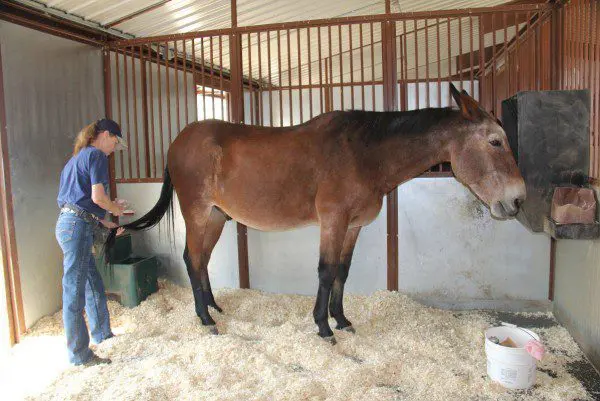Good Management Practices for Health and Insect Control
First and foremost, a routine grooming schedule at least every other week and preferably every week is essential for the hygiene of your equines. We use fly masks without ears on the animals that are sensitive around their faces and we spray with Tri-Tech 14 once a week for insects that will pester your equine. We NEVER clip the insides of the ears. Regular grooming once a week to remove excess hair, mud, etc. will eliminate places on the animal, including their legs, that would be subject to their laying eggs. We worm our equines in January, March, May, July and September with Farnam ivermectin and then break the cycle with Strongid in November to prevent the cycle of internal worms and parasites. Using Johnson’s baby oil in the manes and tails helps keep the flies at bay, helps to prevent “frizzies” and train manes to lay over, and will also keep other animals from chewing on them.
In order to keep flies and other insects under control, all stalls, runs and pens need to be kept free of manure and debris daily. Barns need to be cleaned periodically with disinfectant.
Fields and pastures should be harrowed in the spring, fall and between hay cuttings. Only rake hay when absolutely necessary before baling. Turnout fields should be kept separate from your hayfields. Do not use manure on your hay fields. This can cause an increase in weeds that can attract more insects since equines can pass weed seeds through their digestive tract.
Keep all tack and equipment clean so it does not attract flies to your tack room and grooming area. Spray the tack room when you leave with a household flying insect spray for any residual flies.
Here are several rules to remember for good management and insect control around your own farm:
1) Feed the right kinds of healthy feed for equines and know the differences for mules and donkeys. This requires some research on your part. Do a quick body check at each feeding.
2) Keep all stalls, pens and sheds free of manure (clean every day!) and routinely harrow your pastures.
3) Keep manure collection piles well away from your house and barns (we have ours hauled away weekly).
4) Keep all water sources clean with a weekly cleaning schedule.
5) Practice good grooming practices at least once a week. When grooming, do a complete body check on your equine to look for any oddities that might arise and treat as needed. If certain body areas begin to get sores (like Jack sores), scabs, or bumps, use Neosporin or if they are severe…Panalog, also called Animax or Dermalone by prescription from your vet. And, know WHEN to call your veterinarian.
6) Use Tri-Tech 14 by Farnam fly spray weekly for bugs and insects that can pester your equine. This seems to be the best and longest lasting. Herbal remedies and other sprays will work, but will need to be applied much more often.
7) Never clip the hair inside of the equine’s ears! The hair will keep out most insects.
8) Do not clip the hair on the legs unless you absolutely must for showing! The hair protects the legs from insect bites.
9) Use fly masks for those mules and donkeys that have sensitive skin around the face. Farnam Super Masks will usually fit most animals. You can find them in most tack and vet stores.
These simple rules will help to keep all your animals healthy and happy, and will leave you with a fresh and clean-smelling, nearly insect-free facility.







